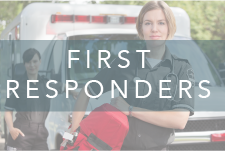Dealing With the Aftermath
COVID-19 has dictated much of everyday life in the United States since its onset in early 2020. This includes school and store closings, social distancing guidelines, and even impacting the options available to get out of the house. However, these effects pale in comparison to those who have suffered from the virus directly and battled its life-threatening symptoms, with entire lives and families being forever affected.
While the omnipresent threat of COVID-19 can feel overwhelming, this notion is even more extreme for those on the front lines – the first responders tasked with helping others in life-threatening conditions amidst an unprecedented pandemic.
The Unique Effects of COVID-19 on First Responders
For first responders, especially EMTs or others in the medical field, increased hours, consistent emergencies, and an overabundance of misinformation pollute everyday life on the job. All of which adds to an already stressful, anxiety-inducing career field. Being tasked with responding to emergencies involving anyone in their community means that EMTs, police, firefighters, and other first responders always need to be vigilant of coming into contact with such a contagious, life-threatening virus.
Having to monitor themselves for any symptoms and being cognizant of potential exposures as they are asked to return to the field every day is incredibly difficult. First responders not only regularly question their health, but also account for risks involved with going home to one's family after a day in the field. They may worry that they are exposing their loved ones to the very same infection that is threatening and complicating the lives of everyone else in the community.
The Strains of an Overtaxed “Alarm Response”
First responders have been heavily operating in an “alarm response” since the beginning of this pandemic era – a state of hyper-vigilance that dictates everything from one's procedures in the field to one's mentality. This alarm response is emotionally exhausting and is a state of mind intended to be employed while coping with emergencies in the moment. Unfortunately, COVID-19 has forced first responders to maintain this same level of hyper-vigilance for the past two years and counting, taking an immense physical and emotional toll on individuals.
This sustained state of mind not only brings intense physical and emotional fatigue, but the continued effects of the coronavirus have left little time for first responders to consider how their own mental and emotional health has been impacted over the past two years. Extended hours have become common and first responders are still tasked with tending to the emergencies, needs, and protection of their communities.
First responders have been pushing down their personal needs more and more, even though they need more time for physical and emotional respite. Additionally, there is still no guarantee of an end in sight, especially with the emergence of the recent Omicron variant. First responders will likely be asked to continue maintaining this self-sacrificial persona.
Anxieties Continue to Mount
As the effects of COVID-19 continue, so too do the stresses, traumas, depression, and anxiety that first responders cope with every day. This creates a palpable fear of how it will impact them when COVID-19 eventually dies down and the extent of the life-changing effects on their mental health is realized. This realization can even come with a degree of shock and further anxiety.
Addressing the effects of COVID-19 on first responders is a dialogue that needs to happen, as building anxieties, traumatic experiences, depression, and fatigue will continue to compromise one's mental health. This can lead to more rash decision-making during high-stress scenarios or cause an individual to look to addictive substances to placate these feelings off the clock.
Preparing for the Aftermath
Even if the traumas and anxieties of the coronavirus are not immediately felt, they are building, and this constant mental state of emergency has a lasting impact on first responders as a whole. They may not grasp the long-term effects of this tumultuous time for years to come. Taking action to support first responders now is necessary.
For some, this can begin with voicing one's concerns to supervisors to open a dialogue, as it is probable that these feelings are universally affecting one's unit. Others may want to practice blackout times where they cannot be contacted or can choose not to expose themselves to news outlets that may remind one of their stresses. Self-care outlets at home and taking one's days off with family to create a time for emotional processing are all necessary.
There can be no way of knowing exactly how all of these notions will come to a head. However, first responders have been tasked with masking their emotional and physical fatigue to protect their communities for a truly inhuman amount of time. Finding dedicated programs or support groups for first responders can help break down this mask and process the astronomical stresses and expectations placed on them.
Getting groups of peers together as early as possible can help process these emotions with safety and support for when the traumas and stresses of the past two years surface. Furthermore, when the alarm response that has consistently dictated their mind and body is finally released and the realization of one's emotional turmoil sets in, help can be available.




